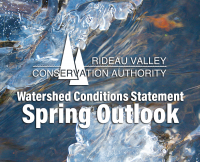March 9, 2018 –The winter of 2017-18 has been one of wide variations and periods of record cold.
First snow on the ground to start this winter was relatively early at the beginning of November but little more fell until after December 28 followed by the onset of the record cold temperatures including -30 degrees on January 1. After ten days of frigid temperatures, a few days of warm temperatures reduced the snow cover significantly. That warm spell ended with a flash freeze. Precipitation in all its forms and widely varying temperatures continued through January into mid-February. Since February 19, maple syrup weather (above freezing during the day, freezing temperatures at night) gradually eliminated the snow cover so that, when Conservation Authority staff did the March 1 snow survey, there was no snow to measure.
As was the case this year, the snow was gone from a thaw in late February for the March 1 snow survey in 2000. Some snow fell afterward but the amount measured on March 15 was a fraction of normal. The maximum flow that year was relatively minor at 245 cubic metres per second (30 year average is 320 cms as measured at the monitoring station Rideau River at Ottawa).
Snow forecast for the next few days will restore the cover to some extent but Meteorological Service of Canada (MSC) are forecasting precipitation around normal for the rest of March. If the weather happens as forecast, a flow similar to that in 2000 can be expected which will cause minor inundation of the lowest lying areas along the Rideau system.
City of Ottawa crews began the annual ice removal program on the Rideau River between Rideau Falls and Bronson Avenue several weeks early in response to the February thaw and related increased flows. Crews will work to keep the ice from reforming until the spring freshet occurs (for more information: City of Ottawa information at 311).
Levels and flows on the Ottawa River are close to normal for the time of year. Flooding in 2017 was caused by a major weather system that produced significant rainfall over a large area in western Quebec and eastern Ontario. Such an event is not indicated in present MSC forecasts.
Water levels on lakes and flows in the streams are presently at or slightly above normal for the time of year as a result of the February weather. With the changing levels that can be expected over the next weeks, ice cover on lakes, ditches, local streams and rivers will continue to be unstable. Caution should be exercised by everyone when near local waterbodies. Parents should inform their children of the risks and provide appropriate supervision.
RVCA will continue to monitor conditions and will issue further statements when or if there is an indication that the situation can be expected to change significantly.
Print this page
March 09, 2018
